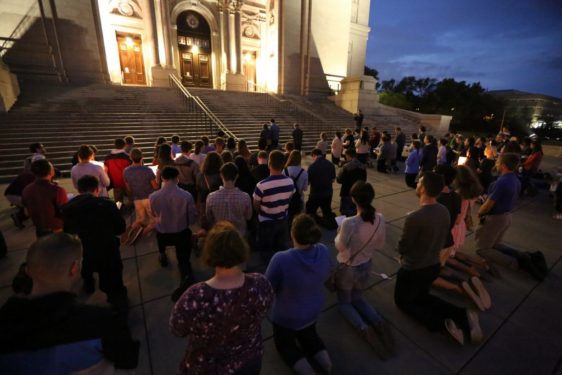
By Christopher White, The Tablet’s National Correspondent
ROME – Ahead of next month’s high-stakes meeting of U.S. bishops, a number of Catholic women and men are petitioning for greater involvement of the laity in the Church’s response to the ongoing clerical sex abuse crisis.
In response to this summer’s wave of sex abuse revelations – from the downfall of former Cardinal Theodore McCarrick to the Pennsylvania grand jury report and subsequently announced state and federal investigations – many Catholic prelates have said that the laity must be given a primary role in ensuring greater protection of minors and vulnerable adults.
Now, as the U.S. bishops prepare to meet in Baltimore from November 12-15, a number of groups are accepting that invitation.
One group, The Women Who Stayed, are channeling the tactics of the reformer Martin Luther and preparing “Five Theses” in order to offer their “two cents” to the conversation.
Launched by Elizabeth Leibold McCloskey and Alice McDermott, the “5 Theses” demands that every diocese release the names of clergy accused of abuse; for every diocese to include the voices of survivors of clergy sexual abuse in every issue of their diocesan paper; and for clergy to commit to simpler living, including “wearing the plain black garb and liturgical vestments of a parish priest and spending time in service to the poor and marginalized for the coming liturgical year.”
The group is also asking Pope Francis to include women as voting members of the next synod and to “name women as the majority of the new cardinals appointed at the next consistory, and every consistory going forward until a balance is achieved;” and to include a prayer for reform in the weekly prayers of the faithful for the next three liturgical years.
In addition to physically presenting these theses at the Baltimore summit, the group is encouraging participants to “Post the following 5 Theses on your church or cathedral door, or place them in the offertory collection with two cents taped to it, or mail them in a letter to your own bishop or archbishop or cardinal.”
Meanwhile, in Pennsylvania – the epicenter of the current crisis – Villanova University’s Task Force on the Sexual Abuse Crisis in the Church has launched a petition, now signed by over 150 academics, with a three-fold action plan.
While applauding the U.S. bishops’ Charter for the Protection of Children and Young People, adopted in 2002, the letter calls for new measures that would make all bishops mandatory reporters to civil authorities of suspected sexual abuse.
In addition, the signatories call for the United States Conference of Catholic Bishops (USCCB) to launch and fund a new long-term study on the clerical sex abuse crisis, specifically to take into consideration what has been uncovered through legal proceedings in recent years.
Lastly, the group calls for the USCCB to facilitate local and national conversations, “something akin to a truth and reconciliation commission,” in order to expose the “dark secrets” within the Church to “the light of day.”
While grand jury investigations have either been announced or launched in more than ten states, the activist group SNAP – the Survivors Network of those Abused by Priests – is encouraging individuals to write their local attorney general to demand a grand jury investigation in all 50 states.
In addition, SNAP is a major sponsor and participant in the upcoming November 3 “All Survivors Day,” the first annual international day for survivors of sexual abuse.
Earlier this week, Cardinal Daniel DiNardo, president of the USCCB, announced that in addition to the scheduled November meeting, the U.S. bishops would hold a retreat from January 2-8, 2019 in response to an invitation from Pope Francis, directed by the preacher of the papal household, Capuchin Father Raniero Cantalamessa.
In addition, Cardinal DiNardo sent a letter to all U.S. bishops last Friday noting that while the USCCB could not suspend all of its business during its upcoming meeting, he was encouraging all U.S. bishops to join him in “intensified prayer” from November 5-11 ahead of the Baltimore meeting.
Cardinal DiNardo specifically asked for prayers “for the healing and support of all victims of clergy sexual abuse, for the conversion and just punishment of the perpetrators and concealers of abuse, and for the strength of the bishops to be holy shepherds in protecting and leading their sheep from all harm.”
“While all Catholics are welcome to join in praying for these intentions,” he noted, “this is specifically an effort of prayer and reparation by the bishops.”
